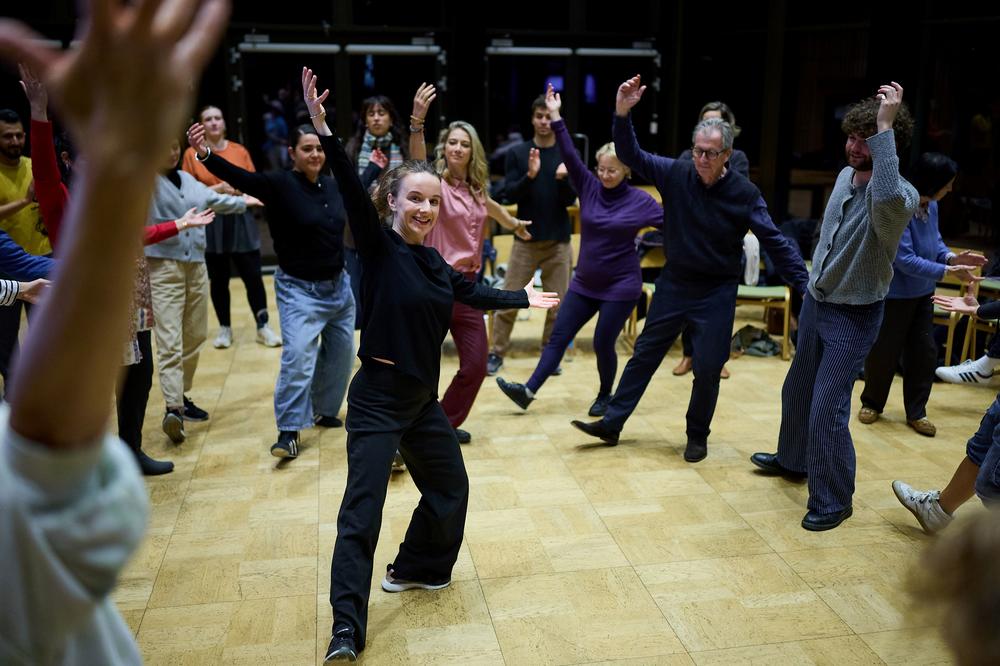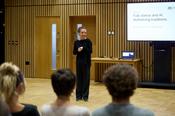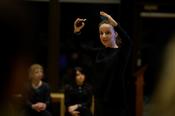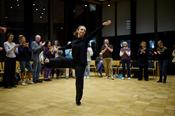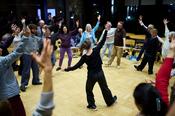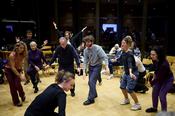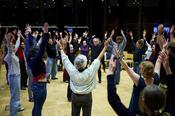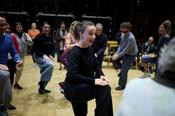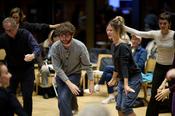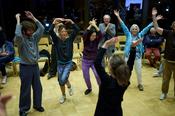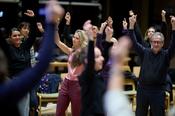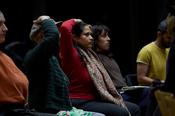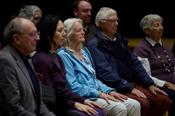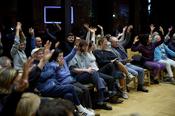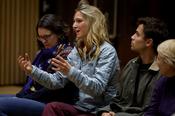Folk Dance and AI: Rethinking Traditions
Performative encounter at the Berlin Oxford Symposium 2025
Oct 27, 2025
People from Oxford were able to experience and reflect on a participatory dance experience as a “pathway to societal impact” in the evening programme accompanying the Berlin Oxford Symposium on 30 September 2025. Thanks to the contribution of Berlin choreographer Irina Demina some of the questions raised by the panel on “Innovation, AI and the Arts” became immediately tangible. The event was made possible by a strategic partnership between TORCH (The Oxford Research Centre in the Humanities) and the HU Office for Public Engagement and Knowledge Exchange with Society at Humboldt-Universität. The evening was hosted by DANSOX, an organisation led by Emeritus Professor Sue Jones, who has been bridging academic (dance) research and artistic practice at the University of Oxford for many years.
Scientists, practitioners and, above all, interested citizens gathered in the evening at St Hilda's College Pavilion next to the Cherwell River to listen to a performative lecture about ‘Folk Dance and AI’ by Irina Demina and to actively participate in it. This took place not only through engaged discussion, but by watching and learning a short dance sequence together before answering some questions: Who created this dance sequence? Was it choreographed or created spontaneously in the moment (improvised)? If it was previously created, by whom? Does a machine also hold the potential to choreograph, and if so, how do artificial and human intelligence engage in a dance dialogue?
Choreographer Irina Demina presented her collaboration with Dr Dávid Samu (Computer Science) to train a machine learning algorithm developed specifically for the project, thereby creating a ‘machine choreographer’. Using motion capture technology, 26 clips of different folk dance traditions were recorded to feed the model with movement material. The resulting hybrid AI choreography was then learned step by step by the dancer – a retransmission of machine-generated movement into the human body. Central to this investigation was the question how folk dances can be reimagined in an age of hybrid and complex identities, and whether AI can help us reinvent and further develop these traditional physical practices.
The audience in Oxford had the opportunity to experience a choreography jointly developed by humans and machines with their own bodies and to ask critical questions, e.g. about how the specific context of these culturally coded folk dances and cultural heritage is dealt with in their transfer to AI and the ethical questions associated with this process.
Irina Demina is the founder of SCARBOD Lab (science-art-body) – an experimental platform for body-based formats at the interface of art and science. She is currently Artist in Residence at the Centre for Cultural Techniques (Humboldt-Universität) and works with researchers from a wide range of disciplines, from cutting-edge STEM to primary education research, to open up knowledge production and make it accessible for different target groups. She is supported in this by the team for Knowledge Exchange with Society, which promotes and supports transdisciplinary and participatory research and teaching across the university.
Further Information
Leonie Kubigsteltig is a program manager at the Office for Public Engagement and Knowledge Exchange with Society at the Centre for Cultural Techniques (Humboldt- Universität zu Berlin).

